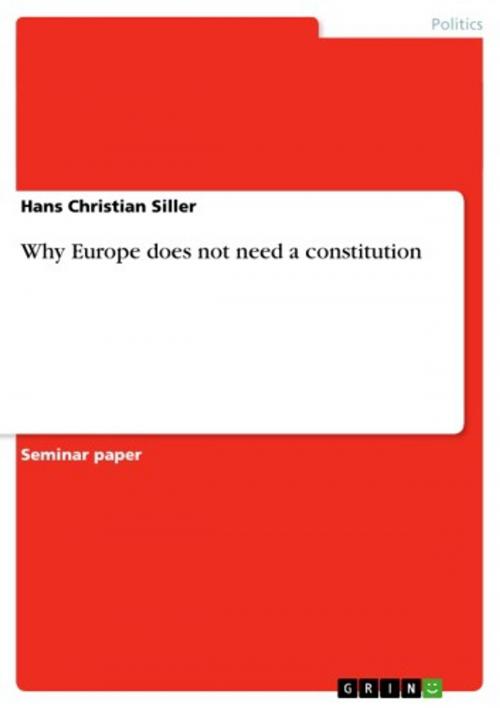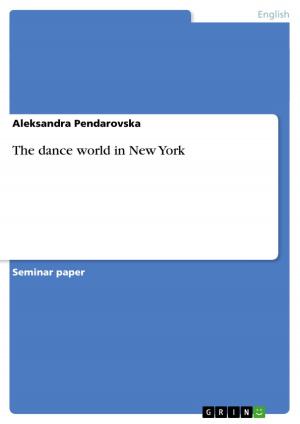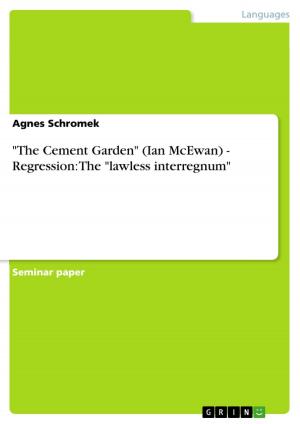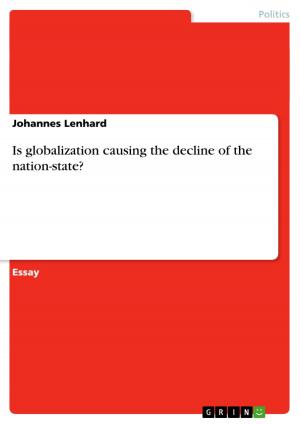| Author: | Hans Christian Siller | ISBN: | 9783638133425 |
| Publisher: | GRIN Publishing | Publication: | July 18, 2002 |
| Imprint: | GRIN Publishing | Language: | English |
| Author: | Hans Christian Siller |
| ISBN: | 9783638133425 |
| Publisher: | GRIN Publishing |
| Publication: | July 18, 2002 |
| Imprint: | GRIN Publishing |
| Language: | English |
Seminar paper from the year 2000 in the subject Politics - International Politics - Topic: European Union, grade: 1,0 (A), University of Freiburg (Political Science), course: VL/HS: Issues of Contemporary International Politics, 59 entries in the bibliography, language: English, abstract: In the last months the discussion about a European Constitution has gained further popularity with the highly controversial speech of German foreign minister Joschka Fischer at the Humboldt University3. Until recently, most draft constitutions like the Spinelli initiative of the European Parliament in 1994 or the Herman Report in 1994 were discussed on a theoretical level without a hope for realization. Now there is a wave of speeches and contribution of key politicians on this subject. In fact, there are reasons to assume that there is more to it that just the typical German focus on constitutionalism4 but that 'a window of opportunity is opening'5: the need for legal and institutional reform becomes evident in view of the incipient eastern enlargement and the results of the Amsterdam Conference and its postponing strategy have satisfied only few. Moreover, the fact that ECSC expires in 2002 gives further monumentum to the discussion about where Europe should be heading in the years to come and how the problems of a deeper and enlarged Union can be overcome. 1 see Schneider, Heinrich: Gesamteuropäische Herausforderungen an eine Europäische Union, in: Wildenmann, Rudolf (Hrsg.): Staatswerdung Europas? Optionen für eine Europäische Union, Baden-Baden Nomos, 1991 (Studien zur gesellschaftlichen Entwicklung, Bd. 9), pp. 125. 2 see Weidenfeld, Werner: Die Reformbilanz der Europäischen Gemeinschaft: 'Bundesrepublik Europa' als Perspektive? in: Weidenfeld, Werner/Wessels, Wolfgang (Hrsg.): Wege zur Europäischen Union. Vom Vertrag zur Verfassung? Bonn Europa Union, 1986, pp. 28, and Hertel, Wolfram: Supranationalität als Verfassungsprinzip. Normativität und Legitimation als Elemente des Europäischen Verfassungsrechts, Berlin Duncker und Humblot, 1999 (Tübinger Schriften zum internationalen und europäischen Recht, Bd. 47), Diss. Univ. Tübingen 1998, pp. 21. 3 Fischer, Joschka: Vom Staatenbund zur Föderation - Gedanken über die Finalität der europäischen Integration. Rede am 12. Mai 2000 in der Humboldt-Universität in Berlin, http://www.auswaertiges-amt.de/4_europa/index.htm. 4 Kohler-Koch, Beate: A Constitution for Europe?, Mannheim, 1999 (Arbeitspapiere - Mannheimer Zentrum für Europäische Sozialforschung, Bd. 8), pp. 2. 5 ibid. pp. 3.
Seminar paper from the year 2000 in the subject Politics - International Politics - Topic: European Union, grade: 1,0 (A), University of Freiburg (Political Science), course: VL/HS: Issues of Contemporary International Politics, 59 entries in the bibliography, language: English, abstract: In the last months the discussion about a European Constitution has gained further popularity with the highly controversial speech of German foreign minister Joschka Fischer at the Humboldt University3. Until recently, most draft constitutions like the Spinelli initiative of the European Parliament in 1994 or the Herman Report in 1994 were discussed on a theoretical level without a hope for realization. Now there is a wave of speeches and contribution of key politicians on this subject. In fact, there are reasons to assume that there is more to it that just the typical German focus on constitutionalism4 but that 'a window of opportunity is opening'5: the need for legal and institutional reform becomes evident in view of the incipient eastern enlargement and the results of the Amsterdam Conference and its postponing strategy have satisfied only few. Moreover, the fact that ECSC expires in 2002 gives further monumentum to the discussion about where Europe should be heading in the years to come and how the problems of a deeper and enlarged Union can be overcome. 1 see Schneider, Heinrich: Gesamteuropäische Herausforderungen an eine Europäische Union, in: Wildenmann, Rudolf (Hrsg.): Staatswerdung Europas? Optionen für eine Europäische Union, Baden-Baden Nomos, 1991 (Studien zur gesellschaftlichen Entwicklung, Bd. 9), pp. 125. 2 see Weidenfeld, Werner: Die Reformbilanz der Europäischen Gemeinschaft: 'Bundesrepublik Europa' als Perspektive? in: Weidenfeld, Werner/Wessels, Wolfgang (Hrsg.): Wege zur Europäischen Union. Vom Vertrag zur Verfassung? Bonn Europa Union, 1986, pp. 28, and Hertel, Wolfram: Supranationalität als Verfassungsprinzip. Normativität und Legitimation als Elemente des Europäischen Verfassungsrechts, Berlin Duncker und Humblot, 1999 (Tübinger Schriften zum internationalen und europäischen Recht, Bd. 47), Diss. Univ. Tübingen 1998, pp. 21. 3 Fischer, Joschka: Vom Staatenbund zur Föderation - Gedanken über die Finalität der europäischen Integration. Rede am 12. Mai 2000 in der Humboldt-Universität in Berlin, http://www.auswaertiges-amt.de/4_europa/index.htm. 4 Kohler-Koch, Beate: A Constitution for Europe?, Mannheim, 1999 (Arbeitspapiere - Mannheimer Zentrum für Europäische Sozialforschung, Bd. 8), pp. 2. 5 ibid. pp. 3.















